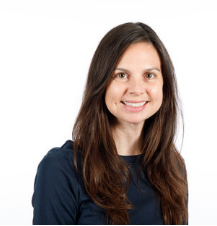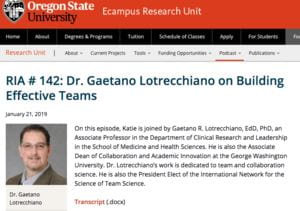This month, we interviewed Dr. Baker about her most recent research on the efficacy of service-learning in language learning.
 Click here to link to the research article.
Click here to link to the research article.
Bianca Trinidad a scholar at the Nashman Center, spoke with Dr. Lottie Baker, one of our Nashman Affiliated Faculty, about her Community-Engaged Scholarship. You can learn more about Nashman Affiliates here https://www.gwnashmancenter.org/new-page-3/.
Dr. Baker works at the Graduate School of Education and Human Development, in the Department of Curriculum and Pedagogy. She works with students who want to be language teachers. Some of her students want to become ESL (English is a Second Language) teachers while others aim to be world language teachers, like Spanish, French, or Chinese teachers here in the U.S. and abroad.
Dr. Baker notes that there is a commitment to community-engaged teaching within the teacher-education program at GSEHD. Students complete a community-engaged teacher experience in the summer, where they partner with a community organization, to work with youth outside of school. “It’s a great opportunity for us, as a university to contribute to the community that they live in here in DC and so, there’s a lot of great work being done in different areas here in DC. So, it’s exciting that we have that opportunity to do that.”
Another piece of my work is what this new article is about. Dolores Perillán, in the Spanish program, does an incredible job in coordinating and facilitating a community-based service learning program. I learned about this program from her and because of my personal interest in Spanish, and realized how impactful it was. She places undergraduate students in community organizations around the DC area, including facilitating placements in bilingual/dual-language schools, which I thought was innovative. I’ve seen and read work about community engagement in language settings, and I haven’t seen a lot of having students go to dual-language schools. I saw this as an opportunity to explore how that was working. So, that was where this research idea was born.
We asked Dr. Baker what inspired her to be involved in this kind of research.
I am a Spanish learner myself, and I always love opportunities to practice. When I started this position in GW a few years ago, I came to a few events that Dolores hosted, and I was so excited to hear Spanish and use Spanish because of my interest in language learning. I feel pretty strongly that part of the role of a university is to contribute to the community that we are in. I live in DC and through my own involvement with community organizations I see there is a lot of great work being done to support immigrant populations. Working as a faculty member at GW allows me to make connections and to contribute to that great work that is being done with those communities.
For the article I looked at a few things. Professor Perillán collects, reads and gives feedback to blogs that students write. So, I read some of these blogs . Then I also followed 4 students, which meant that I interviewed them several times and visited them in their placement schools. The topic of the interviews was about how this experience of working in dual-language schools improved their Spanish language acquisition and what their perspectives were. I was happy to see that they were really thoughtful about how these experiences contributed to their language learning. They were able to articulate how being in that classroom really helped hone their skills and use particular strategies for learning languages. So, we always hear people say “Immersion is the best way to learn languages”, but what does that actually mean? It’s somewhat of a myth, because you can’t just go to another country and think that simply by being there you’ll pick up the language automatically. You need to try to use the language and reflect on it if you really want to learn a language. So, it was nice to talk to students who really got this concept. The service learning experience enabled them really to use Spanish and be reflective about it – what’s helpful for immersion settings to work. It was good to see that they could really dig in to that process of when they were in a school, what they did. For instance, they could articulate how particular interactions helped them learn and practice these strategies of listening in the target language or responding to someone else in the target language and being able to hold all that information all at once. I found it interesting how thoughtful these students were about their experiences in language learning.
Dolores Perillan is the one who does a lot of the hands-on coordinating; it’s amazing how much work she does. My research question going into it was to understand how students perceive this experience of working in a dual-language school and how they perceived it in their language acquisition and language-learning process. I read some of their blog entries in Spanish for the program, analyzed those, and focused on 4 specific students. I interviewed them a couple of times, and then, I visited them when they were in the classrooms to see what their experiences were. So, what I found was great because these interviews really showed how these experiences in the school really helped them hone particular skills, and they were also - maybe it was the fact that I was interviewing them - but they were able to reflect on what it means to learn a language, and what was difficult for them. And another thing that came out of it that both the students in the blog and those that I interviewed is that they used Spanish that they didn’t use in the classroom. So even students who were more advanced said that there were a lot of words that they had never used in the classroom. For instance, one student mentioned words that were related to habitats, because the classroom was studying about habitats in 2nd grade, and she’s never learned about habitats in Spanish, because she started learning Spanish in high school. It was helpful for intermediate students too. In general, a lot of these community service-learning opportunities in university language programs are designed for advanced learners. The dual language school is a unique environment that really supports language learning and makes interacting in Spanish more accessible for intermediate students. We call it educational scaffolding, where you give a lots of support when you want to tell ideas, and so, the teachers are doing lots of support, such as using images and gestures. So, I think that’s a positive thing.
Why do you think it is important for GW faculty to be involved in community-engaged scholarship or research?
We are very privileged to be at a university like this. The students here are privileged because they’ve been able to get to college, which means they have literacy and education, plus the means to be here in GW. And, there’s a similar idea with faculty – we are also privileged with the education and experiences to get to where we are now. So, I think as a university community, we should recognize these resources we have and contribute to the world that we live in, and we can do that directly through the DC community, which goes much further than Foggy Bottom. The college setting is unique because it is our job—students and faculty-- to do in projects like this where we learn and interact in the community. That’s something that is really special and that you can’t find in many jobs.
I teach courses in language education and they’re part of the graduate program for secondary education; for TESOL (Teaching English to Speakers of Other Languages). So, if people are interested in becoming a teacher, then I encourage them to explore the programs that GSEHD has, because we have multiple pathways to become a teacher. And some of them are where you can get licenses to become a teacher here in DC or the U.S., and some are where you can just learn some of the skills and knowledge to become a teacher in a private school or overseas.
And for those students interested in Spanish, another pathway starts at the undergrad level. Students who are majoring in Spanish, for instance, can take graduate courses their senior year. And then, earn a master’s degree in just 5 years; so in 1 year after they finish their bachelor’s degree. So, that’s a new program that we are beginning, and we are starting it also within other content areas. But, regardless, undergrads at GW can come to GSEHD to earn a Masters in our intensive 13-month program after they finish. So, I hope GW undergrads in our program will grow, because I think GW has a lot of smart, creative, thoughtful students who would be wonderful teachers. And our programs are related to community-engaged teaching and so, not only do we put our students in schools, where they work with mentor teachers, but as much as possible, we like to expose them to working with other organizations in the community.




















